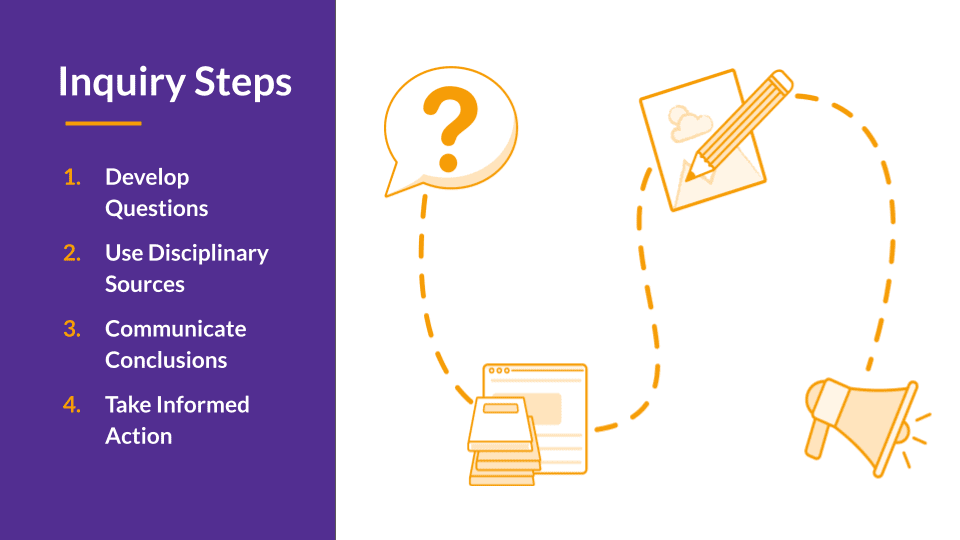
TCI’s high-quality middle school social studies curriculum includes an inquiry pathway that challenges students to investigate the world around them. Like the program’s video-based Geography Challenges, this pathway keeps students actively engaged in their learning. By actively participating in the inquiry process, students gain the tools to dive deep into social studies. Meanwhile, teachers are empowered to become effective facilitators with the help of interactive slideshows, scaffolding tools, and built-in sources and activities. This dynamic approach not only fosters a deeper understanding of social studies but also cultivates critical thinking skills.
Unit Inquiry in History Alive!
At the beginning of a unit, students are introduced to thought-provoking questions like “How much are we able to know about the first human civilizations?” They are asked to conduct thought experiments such as choosing an object near them and imagining how people 1000 years in the future would interpret how civilizations today lived. By fostering curiosity and hands-on learning, TCI keeps students motivated and helps them develop the ability to make sense of the world around them.
Based on the C3 inquiry arc, TCI’s inquiry pathway takes students through 4 steps:
- Develop questions: Begin by asking and developing interesting questions.
- Use disciplinary sources: Collect evidence from a variety of sources to help answer the questions.
- Communicate conclusions: Draw conclusions from evidence and share the findings with others.
- Take informed action: Apply what has been learned to make a positive impact on the community through informed and meaningful action.

Inquiry Types
Throughout the program, students will find four types of inquiry: Structured, Guided, Embedded Action, and Student-Directed. Each type of inquiry provides a different level of guidance—from structured to open for students who want to pursue their own historical questions.
- Structured Inquiry. Structured inquiry provides students with a question and guides them through answering it. Through the investigative process, students develop an explanation and argument to respond to the question. For example, in one of the structured inquiry in the new History Alive! In the Ancient World, students explore the question, “How much are we able to know about the first human civilizations?” and follow the steps to create a video advertisement that explains why it is important to protect artifacts.
- Guided Inquiry. In Guided Inquiry, students are given a question to dig into. They devise their own method for answering it. Students are still expected to use evidence to construct an argument. In a Guided Inquiry, students are given the question “How does geography influence culture?” and share their findings in a digital presentation.
- Embedded Action. The Embedded Inquiry ask students to take informed action as a result of their investigation. For example, students are asked the question “How can people make a change for the better?” and research three ways life is better now than in the past. They apply their findings to create an informed plan to make a change in their community for the better.
- Student-Directed. Student-directed inquiries are the most open-ended of the inquiry types in History Alive! The student-directed inquiries use the same framework as the other types but are more open-ended so that students define their own compelling and supporting questions, methods for investigation, and performance tasks.
Want to learn more about TCI’s unit inquiry? Explore the Using Inquiry Projects to Drive Student Learning webinar.
In addition to the Inquiry Pathway, there are many opportunities to nurture student curiosity in TCI’s middle school social studies programs. From investigating primary sources to exploring multiple perspectives, the program’s rich resources will keep students asking questions and looking for answers.
Want to get the latest on new features and program updates? Sign up for TCI’s newsletter to stay in the know.


